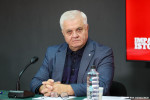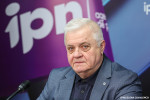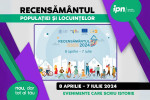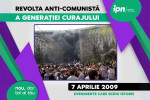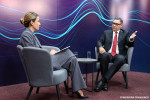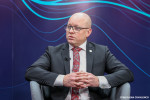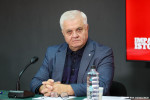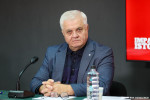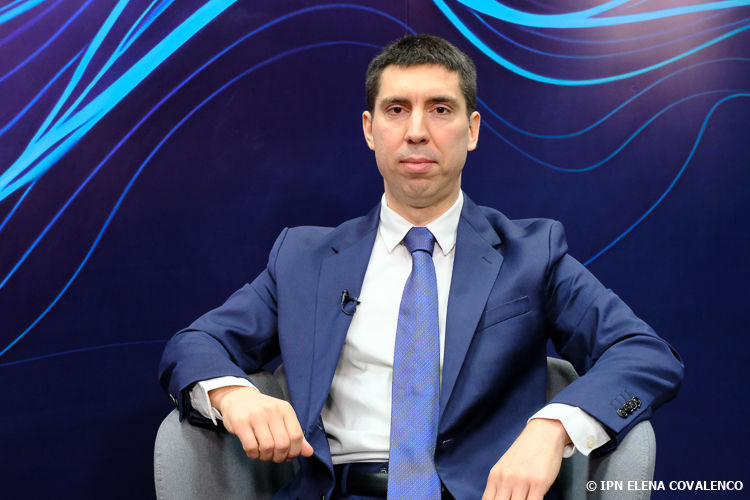
The Republic of Moldova has no viable alternative outside the European Union, states the Deputy Prime Minister Mihai Popsoi in an interview for IPN. In a tense geopolitical context, he emphasizes the importance of media education, critical thinking, and the constant support provided by the EU for strengthening the resilience of the state and supporting its European path.
IPN: The Republic of Moldova remains in a very complicated situation and area, having to use its entire diplomatic potential to obtain political, economic, and security support. Do you think there is enough understanding in society about this at the moment?
Mihai Popsoi: Certainly, we have seen the results of the referendum - the majority of our citizens have expressed their legitimate aspirations to be part of the larger European family. It is true that there were also many who saw things differently.
Unfortunately, for various reasons, we have been and remain the object of an informational war, a hybrid war, and also a full-scale war - the one we can see, with great regret, in Ukraine.
The vast majority of citizens understand that only within the larger European family can the Republic of Moldova fully utilize its potential - economically, culturally, and in terms of security.
For over 30 years, we have been at the mercy of the wind. We have always hoped to become a part of this family, in which our Baltic friends and our brothers from Romania are already members. When our citizens go to the European Union, work or study there, they see with their own eyes the differences. Only those who have never been there choose, with determination, to close their eyes to these realities – to the essential differences in living standards, comfort and safety offered by the European Union compared to any other possible alternative. In fact, if we look pragmatically, after all the wars of aggression by the Russian Federation – against Georgia, Ukraine, and even our own country – it is clear that there is no other viable alternative for the Republic of Moldova.
"We are confident that more and more citizens will support this path"
Therefore, the only strategic direction for a country like the Republic of Moldova is European integration. We are confident that more and more citizens will support this path, even though the outcome of the referendum was a narrow victory. As we continue to attract more resources and make concrete improvements in the lives of our citizens here at home, support for European integration will inevitably increase.
Every time we face a crisis and our country goes through difficult times, who is there to help us? The European Union! While Russian drones fly over our airspace, the EU offers financial support for roads, hospitals, schools, and even for the defense sector.

To be honest, I am often astounded by the reality we live in. Some pro-Russian politicians choose to completely ignore direct threats to our security. Drones are falling in the south of the country, in Gagauzia, and they are competing to bury their heads in the sand, displaying an ignorance and attitude that is difficult to explain when it comes to the safety of citizens. Each of us, when it comes to children, health, life, we dress them well, we give them appropriate shoes, we feed them properly in order to protect them. So how can it be explained that, at a national level, some politicians stubbornly ignore such an obvious threat - explosive drones flying over our skies?
IPN: As you mentioned, Russia has been waging a hybrid war in Moldova for some time now - and, in some places, succeeding. Especially through the tools used by pro-Russian politicians, who are playing their game. What can the state authorities do to increase resilience to these hybrid attacks?
Mihai Popsoi: When we talk about attempts to influence public opinion, we must recognize the devious influence exerted by the Russian Federation. It tries, through various methods, to control the informational space and, by extension, manipulate the thinking of citizens in order to ultimately influence their vote in favor of pro-Russian politicians.
The only real remedy is open and transparent communication, as well as serious investments in education - in the development of critical thinking, in the knowledge of our history, both recent and distant. Because if we look carefully at our entire history, as well as the present reality, we can clearly see that only within the European space can we benefit from modern standards of living. In contrast, in the Eastern space - unfortunately - the so-called "Russian world" brings only destruction and suffering. And we, as a people, have experienced this reality not only for decades, but throughout centuries.
Our citizens, from young to old, must know this history. And in the present, we must also be well-informed. I would make a simple comparison here: in our daily lives, we try to feed ourselves with fresh, quality products. However, when it comes to "informational nutrition," some of our citizens continue to consume information from ... let's say, dubious sources. And I think I have been diplomatic enough.
IPN: So it's about media literacy, which unfortunately is still almost completely absent in our country...
Mihai Popsoi: Exactly. It is our common responsibility - of the political class, civil society, journalists, and citizens - to make a minimal, but essential effort to distinguish between a credible press institution and a dubious source. Just as we would not give our children products of uncertain origin or with a questionable reputation, we should also approach information in the same way. Unfortunately, some of our citizens have been prisoners of sources of propaganda - sources that do not have their best interests at heart, that have one goal: to undermine the sovereignty, integrity, and independence of the Republic of Moldova, to divert us from our European path, and to promote an agenda that is not in our national interest.
Therefore, it is essential to encourage critical thinking, healthy public debate, and obtaining information from multiple sources, in order for each citizen to form their own opinion. It is important to identify authentic sources, and not various "speakers" who often come with a hidden agenda.
We must cultivate this civic spirit and critical thinking from a young age - something that is already happening to some extent, but needs significant expansion, including in the public space. It is a shared responsibility. Because if we expect everything to come only from politicians, we will not get very far.
"This change in mentality does not happen overnight."
IPN: Since we have discussed dubious sources, misinformation, and propaganda, we can bring up a topic that has been the target of such media campaigns: the energy crisis. The authorities had to make several public statements to clarify the situation, to help ordinary people understand better what is happening. Do you think enough light has been shed on this subject?
Mihai Popsoi: When it comes to communication, it is probably never enough. However, I can say with certainty that all my colleagues - from the government, parliament, and the presidency - have made maximum efforts to explain the reality as clearly and transparently as possible. At the same time, we have also explained the actions taken and the solutions identified.
Thanks to the close collaboration with the European Union, the energy crisis - as with other previous crises - was efficiently managed. The support of our international partners, as well as the clear vision of the government accompanied by prompt interventions, were decisive.

This crisis, clearly caused by the Russian Federation through the interruption of gas deliveries, including to the region of Transnistria, demonstrated that there are alternative solutions. Things that we have mentioned before, and now they have been proven true: there are alternative sources and routes for supply. Unfortunately, some pro-Russian politicians have tried to distort the truth and shift the responsibility onto the authorities in the Republic of Moldova, when it was clear to everyone where the gas was coming from and who decided to interrupt it.
The fact that the European Union came with substantial support - both for the right bank and the left bank of the Nistru River - once again showed who our true partners are, who wants our wellbeing. At the same time, it was also seen who is trying to destabilize the country at all costs, to fuel fear, hatred, and suspicion among citizens.
The EU has shown that it is a reliable friend, even for residents of the Transnistrian region - the vast majority of whom are legal citizens of the Republic of Moldova. Even the most convinced pro-Russians, who stayed in the cold with their small children, abandoned for a whole month by the Russian Federation, started to question when they saw that the EU, through the authorities in Chisinau, offered concrete support. It was clear who our friends are and who are just pretending to be our allies.
This support is reflected not only in overcoming the energy crisis but also in real investments in schools, hospitals, roads - through projects such as the European Village. The European Union has been and remains with the Republic of Moldova.
In contrast, the Russian Federation continues a barbaric war against our Ukrainian friends, and we feel the consequences. Not only from the drones flying over our airspace and sometimes even falling near people's homes, but also from the economic impact - inflation, energy crises - all are direct effects of the Russian aggression.
Unfortunately, some citizens - influenced by pro-Russian politicians and dubious media sources, supported from abroad - live in a parallel reality. There is still a lot of work to be done to convince them, even though the majority are well-intentioned people. But for 30 years, they have been left prey to propaganda, consciously and systematically.
This change in mentality does not happen overnight. It takes time, patience, and active involvement from everyone - politicians, local leaders, mass media, and civil society - to build an informed, resilient society firmly oriented towards European values.
IPN: How are Moldova's progress perceived abroad and what are the weak links?
Mihai Popsoi: All European Union countries, without exception, greatly appreciate the efforts made by the Republic of Moldova in recent years to advance on the path of European integration. However, it is clear that the judiciary remains the weak link. We do not hide this fact and we never intended to. We are transparent about the difficulties we face.
There have been significant successes - many corrupt judges and prosecutors are no longer in the system. However, there are still some who sabotage the external evaluation and cleansing processes. We have a large deficit of convictions, and this is directly pointed out to us by citizens. It is one of the main criticisms of the government, both in the presidential campaign and in the referendum campaign.
We hear them and we are confident that things will improve - in the judiciary, in the prosecutor's office. The results so far oblige us to intervene more decisively. Citizens need to see justice, convictions where necessary, not excuses and evasions.
At the same time, one of our biggest achievements is the consolidation of state resilience. As a society, we have become stronger, more resilient, especially in terms of energy security. We have diversified our sources of energy and are no longer at the mercy of the Kremlin. We have strengthened information and cyber security - critical areas today. We have also made progress in controlling our airspace.
Of course, we still have work to do - we do not yet have all the necessary capacity and equipment to eliminate threats, which unfortunately continue to appear disturbingly regularly. Only a politician who has nothing to do with national interest can ignore these dangers or try to minimize them.
The transformations appreciated by our European partners are exactly the ones appreciated by the citizens of the Republic of Moldova: more security, more investments in villages and cities through the "European State" project, direct support for families through subsidies on bills. I can't even imagine what would have happened if there hadn't been this colossal support from the European Union to mitigate the energy blackmail exercised by the Russian Federation.
We know that we still have work to do - reforms take time, institutions need to be strengthened, the economy needs to become more competitive. But we work every day to offer our citizens safety, dignity, and a European perspective.
"We want to open the first chapters of negotiations in the second half of this year"
IPN: We know that all journalists are asking you the same question: when will Moldova join the European Union? And if this happens by 2030, as the authorities have stated? We are not asking for an exact date, but we ask differently: what is our capacity at this moment?
Mihai Popsoi: Our capacity is a good one and continuously improving - which is extremely important. All our European partners, without exception, support us in the process of institutional consolidation, in preparing for the harmonization of legislation and negotiation of the 33 chapters of accession.
We want to open the first chapters of negotiations in the second half of this year, during the Polish presidency. I have just discussed this with the Minister of Foreign Affairs of Poland, Radosław Sikorski. Similarly, my counterpart from Denmark - a country that will take over the presidency in the second semester - has confirmed their support.
Everything depends on our capacity to deliver the reforms. And we are working to demonstrate this capacity. Our goal is clear: we want to conclude negotiations by 2029, in order to join in 2029 or 2030. We are ambitious, but also realistic. We prefer to promise less and deliver more - this has been our principle from the beginning.
We know that there are areas where harmonization of legislation is lagging behind, but by increasing institutional capacities, we will accelerate the process. We have European support, but - as it is well said - we must first help ourselves. And that's what we do every day, in ministries, in Parliament, at the Presidency, in local administrations.
Constructive criticism is welcome - it helps us improve. But it is also important to appreciate where things are changing for the better. We must not fall prey to propaganda or insidious manipulations. We cannot accept war not being named as war, or suffering not being recognized.
IPN: What does the European Union mean for a country like the Republic of Moldova?
Mihai Popsoi: For the Republic of Moldova, the European Union means economic opportunity, stable and well-paid jobs, dignity, quality services - in education, healthcare, administration. Everything that means a safe and prosperous life, as we see it in France, Germany, the Netherlands or Poland: modern infrastructure, clean water, street lighting, efficient cadastral services, good roads, safety in daily life.
The European Union is a guarantee for a decent life for citizens. It's not perfect - no family is - but it is a community of values, solidarity and mutual responsibility.
With a population of nearly half a billion and enormous purchasing power, the European Union is the world's strongest economic engine, and our accession to this family means prosperity and security.
I am confident that more and more citizens will contribute to this effort. We are Europeans - we just need to legalize this status through official accession. I thank all those who have supported this journey.

